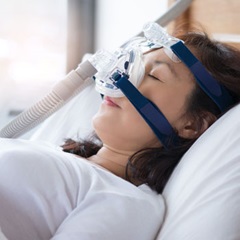Peaceful Sleep Lowers Atrial Fibrillation Risk

Answer a few questions and we'll provide you with a list of primary care providers that best fit your needs.
Does your partner’s snoring, too much screen time before bed, or Fido’s midnight whimpers frequently disrupt your sleep? If so, you could be at higher risk for atrial fibrillation.
AFib is an irregular, rapid heart rate that may cause heart palpitations, fatigue, and shortness of breath. It’s also a leading cause of stroke, with a risk that’s five times higher than the general population.
Research has shown an increased risk for AFib in people with untreated sleep apnea, which is characterized by frequent pauses in breathing during sleep.
New eye-opening research reveals the AFib risk goes beyond sleep apnea to include any kind of sleep disruption.
What’s the Poor Sleep-AFib Link?
A Heart Rhythm Journal study reviewed and cross referenced four research studies and found a link between AFib and poor sleep quality. Investigators noted frequent nighttime awakenings and less REM (rapid eye movement) sleep as predictors for development of AFib. Sleep duration was not found to be a risk factor.
Premier Cardiovascular Institute electrophysiologist Thein Tun Aung, MD, notes how this study differs from other similar research.
“The difference is that this study focuses on the sleep side,” he explains, noting that past research has focused on the AFib side of the equation to explore a sleep connection.
Why Is Poor Sleep Bad For Your Heart?
Adding to the study findings, Dr. Aung says, “REM sleep is important for regulation of the body’s hormones.” This regulation affects many body processes, including your cardiovascular system. Interrupting REM sleep can negatively impact cardiovascular processes.
“It’s not a one-day thing,” he cautions. “It’s every night, every hour, and over many years that can put a stress on the heart.”
Ways To Improve Your Sleep
 Dr. Aung advises paying attention to your sleep quality and not dismissing sleep disruptions as a normal part of life. He says that there’s much you can do to improve your sleep and reduce your risk for developing AFib.
Dr. Aung advises paying attention to your sleep quality and not dismissing sleep disruptions as a normal part of life. He says that there’s much you can do to improve your sleep and reduce your risk for developing AFib.
Practicing good sleep hygiene is a start. Try these recommendations if you have trouble sleeping:
- Avoid caffeine late in the day
- Don’t eat a heavy meal before sleep
- Don’t use digital devices or watch TV before bed (blue light from digital devices block secretion of melatonin)
- Exercise regularly
- Go to bed at a reasonable hour and on a regular basis
- Use the bedroom only for sleep
If your sleep issues don’t resolve with lifestyle changes, you may have sleep apnea. Talk with your health care provider to begin evaluation. Sleep apnea can be managed, which can also reduce your risk for developing AFib.
Answer a few questions and we'll provide you with a list of primary care providers that best fit your needs.
Source: The Journal for Sleep Specialists; Harvard Health Publishing; National Sleep Foundation; Heart Rhythm Journal; Thein Tun Aung, MD, Premier Cardiovascular Institute





